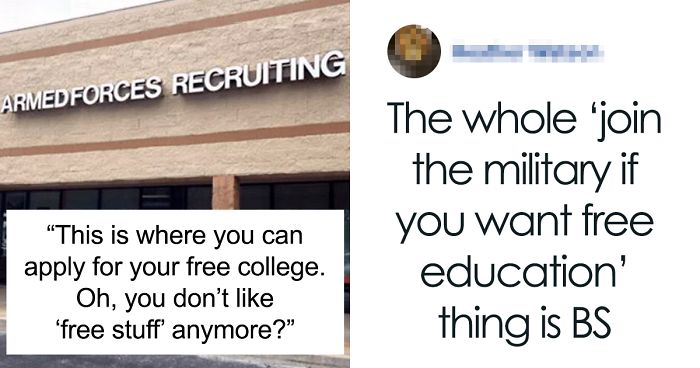
Baby Boomer Suggests Everyone Who Wants “Free” Education Should Join The Army, Gets Shut Down By Millennial
Baby boomers (born between 1946 and 1964) and millennials (born between the early 1980s and early 2000s) don’t see eye to eye on many things. The price of higher education is one of them. To put it simply, millennials want cheaper tuition and baby boomers believe that they’re entitled to even think so. And this recent exchange on Facebook perfectly illustrates this conflict.
According to HSBC’s 2017 report, The Value of Education, The US again emerged as the top choice for parents considering university abroad for their child – but also one of the most expensive, with parents contributing an average of US$58,464 towards their child’s education in the US per year (including tuition fees, transport, books and accommodation).
According to Top Universities, the very top US universities (the majority of which are private non-profits), fees and living costs are likely to add up to as much as $60,000 per year, but it’s also possible to study in the US at a much lower outlay. “Those seeking a more affordable option will find lower tuition fees at US universities within the public sector. These are typically run as state university systems – collections of colleges within a state, which share some administrative aspects while operating as separate institutions.”
As College Board states, tuition fees for 2018/19 at state colleges are an average of US$10,230 for state residents, and $26,290 for everyone else. This compares to an average of $35,830 at private non-profit colleges.
To put things into perspective, the Bureau Labor of Statistics reports that an Average 20 to 24-year-old American working full time earns about $596 per week or $30,992 per year.
People had a lot to say about this subject matter
Do Millennials Have It Worse Than Baby Boomers?
93Kviews
Share on FacebookI will never understand how our country has endless amounts of money to send our young people to die in wars, yet we seemingly never have any money to allow our citizens to better themselves.
I'm so grateful that I live in a country where education is free. Otherwise there would have been no chance in hell that I could have studied for 11 years at university, as my single mother of three was an low income taker. And no, we don't pay 65% tax, if you make a ton of money, then you pay 50%, the lowest rate (if you earn less than 19 247 kronor per year, it's tax free) is 29%. Even if 29% sounds like a lot, we have nearly the same percent millionairs in my country as in the USA. So obviously taxes doesn't effect the possibility to become rich.
Can you say that a little louder Lingon..I don't think the conservatives in the back heard you? I had friends that were freaking out about the possibility of Bernie Sanders becoming president of the USA. They were middle income families that were panicking about being taxed at 40%. Their theory "I shouldn't have to work my a*s off to have the same stuff as the lazy person who doesn't want to work." I tried to tell them how socialism works with everyone getting the same "vouchers" for living expenses..but the people that earn more can get bigger and better cars and houses while going on long vacations. I informed them that nothing of their lifestyle would change..what would change is who pays for it. It's still a situation of the more you work the more you get.
Load More Replies...I very much understand the Millennial angst and anger. I'm a late boomer (1960) who didn't get to go to college at 18, even though I had the grades (s****y parents who could've easily sent all 5 of their kids to college, but washed their hands of each of us when we hit 18). The bill for tuition when I was between 18-22 would've been so cheap, but because I was working full time and supporting myself on very low pay (rate of pay for my first job: $3.45/hour), and because I had no support system of people to counsel me on financial aid, I couldn't afford to even pay that little. It took being laid off at 51, going on unemployment for the first time in my life, and qualifying for a Workforce Development grant to pay for my Associates degree to get me started. On 5/22/19, I will be graduating with my Masters degree in Conflict Resolution. However, job hunting for me is even more difficult than for my much younger cohorts because I get to encounter ageism too.
Wow! That's an amazing effort, Kathryn. Congratulations on your upcoming graduation and all the best for your job hunting.
Load More Replies...This is why I loved Michael Moore's "Where to Invade Next". He showed the best policies from foreign countries that would be great for America. I watched that movie and was like "Why the hell don't we do that?". Things like universal healthcare, affordable/free higher education, better pay/employee health programs, and decriminalizing drug use with better rehabilitation programs to name a few. Watching that was an eye-opener for me.
Hi Brandon-Its amazing looking from the outside at just how far behind everyone the USA govt is. Come live in Australia for a year. Listen to the politicians FIGHTING EACH OTHER TO SPEND MORE on public health, education and welfare. Its completely normal all around the first world. So glad Im not American...The USA only cares about the 1%
Load More Replies...Why don't we start by fixing up our 1-12 schools so at least people will have a good basic education by 18 yo? Instead we have ghetto schools literally graduating functionally illiterates.
Good idea. America has this crazy system where schools are funded by local property taxes, so poor schools stay poor and rich schools stay rich. In countries like Canada, schools are funded at the provincial (i.e. State) level, so rich people have to fund schools for poor kids whether they like it or not. But good elementary education is about more than "fixing" schools. It's about safety, nutrition, community, etc. That would require a more just society, which doesn't seem like it's going to happen any time soon.
Load More Replies...Boomers created and pushed credit debt, teaching GenX (me, hi!) to buy things on credit. Now, enough GenXers are realizing we were blindsided by not really understanding the ramifications and we're teaching our kids, Millennials and GenZs, the dangers of credit in a world where prices are so astronomical that it's nearly impossible to buy even what you need without credit. I'm really scared for my GenZ kids. They're facing serious decisions right now about their future and the financial cost of any decision they make is high.
Using a credit card is a choice. Yes they are relentlessly marketed to everyone. Buying into that marketing machine is a choice. If you choose to use credit to live beyond your means, it's not someone else's fault. Facing serious decisions & the related financial cost of those decisions continue throughout life. For everyone. Not just GenZ kids. Teach your children about credit. Teach your children to recognize when they're being marketed to. Because they're ALWAYS being marketed to. Teach your children to take responsibility for their choices.
Load More Replies...how quickly the baby boomers seem to forget that their generation was the first generation to proactively rebel against the status quo, and started demanding more opportunities, more rights and more personal freedom.
Go to europe (not GB) if you want an affortable good education. If you are a citizen of the european union it might even be for free. If you decide to stay you also don't have to worry about health care, your finacial situation when you stop working or other problems the US seems to be unable to solve
There's nothing wrong with free education if it results in the person educated being significantly more productive over her work life. Education is a very sound investment. The irony is this same boomer probably thinks early grade education being free is perfectly normal. It's just free college that is offensive to him. How does that make any sense?
Military doesn't offer "free" college, they make you earn every penny. They work you like a dog for the first 3 years. I remember the first talk the RDC's gave us in basic training. He asked..."Who here joined for the college money?....you're going to find out that it would have been easier to just work your way through school....." and then just laughed. Let me tell you he wasn't wrong.
Talk about affordable health care, and nincompoops face-fart about every wino getting a liver transplant. Reductio ad absurdum! People who think that affordable education and healthcare are "unicorns and rainbows" live in ivory towers where they are sheltered from reality. Besides, right-wingers have their own unicorns-and-rainbows B.S.: trickle-down economics.
In Australia the government pays for university and once you start working and making a certain wage it takes a percentage out til it's paid back. I earn minimum wage so have never paid it back! But I think it was 100% free for my parents (baby boomers)
The middle clases in the USA have been so raped by successive Govts that most of them dont realise just how far behind the rest of the world they are now. Heads full of "ra-ra America" when actually the USA doesn't give a dam about them.
I’m 29. I never ever considered college as an option. I only make $9/hr In the kitchen of a local diner. Like $450 every 2 weeks. I am broke af & accept I always will be. Our generation of college grads are also broke af but they also have massive debts. I cannot understand why we don’t look at other successful happy countries & think “hmmm seems like they know what’s up let’s do it their way” America as a nation is a child compared to how old other countries are. Let them teach us. We are young. We can learn.
If you are able bodied, go to a constructions site. If you work hard you will rise the ranks very quickly, even in a down market. You'll make way more money than you are now, day one. Bust your a*s and by 35 you'll be living comfortably.
Load More Replies...I lived in Turkey for a few years where the university and healthcare (by law, your employer starts paying for your healthcare and retirement insurance when you start working and when you retire, the government starts paying you every month) is free. Because people pay taxes and in a way the tax goes back to people. Even though the s****y government steals most of the taxes, there's still a lot left to provide free university tuition and healthcare to the ones who need/want it. If a country like Turkey can, America should be able to do it without much effort. Maybe they care more about sending their children off to war for free than to a good school. Who knows?
The military didn't want me. I'm going to have to be elected President instead.
Go for it! I actually think you will be a better president than the one you have now. He did set the bar very low.
Load More Replies...What we need to do is give companies more tax breaks if they substantially raise wages. Increase taxes a small percent, so that with better wages even with higher taxes, people will bring home more. The funny thing is when people make more, they tend to spend more. We need more affordable education with on the job training included and possibly a system that has you pay back what you borrowed only if you make over a certain amount of money WHEN you get a job. Also make housing more affordable and get rid of variable rate loans, this is what caused the housing crisis of 2008. People that were buying houses could afford their $600 a month mortgage until the banks lumped their loans together and sold them off to other institutions/investors that wanted a higher profit margine and jacked up those rates so that person that was getting by paying $600 started getting a bill for $800,$900,$1000 etc. And fell behind and eventually lost their homes, only to have those same institutions who..
Brilliant new idea. Conservatives and Baby Boomers should have their internet access revoked and be given mutes buttons so we don't have to listen to them anymore.
We can all learn from each other, no matter the age, experience or background. I question your 'brilliant' idea and suggest 'arrogant' as a more accurate adjective. just 'mute' people so you don't have to listen? Wow.
Load More Replies...Many of the Boomers, and whatever the generation before them was called, are living as though the Golden Age of the 50s and 60s is a right, and that they can somehow get things back to how they used to be. I think there is a similar version of it in the UK, which is how we got the colossal farce that is Brexit. Technically I am a Boomer, but I know that the world has moved on, there are too many genies that can never be forced back into the bottles and we must deal with the world as it is now. I don't know what it will take to force a revolution, both in how we treat people and how we treat the only ball of rock we have to live on, but I do wonder if it will happen in our lifetime. Or if bread and circuses will lull EVERYONE into walking off the cliff.
I'm a boomer and a veteran. First of all, I don't know if the boomer in this article SERVED, but today's GI Bill is NOT the same one WE got. We contributed NOTHING to it, got a monthly stipend for going to school, at a time when grants like BEOG (precursor to the Pell grant) and small low interest loans were enough to cover tuition. I don't understand those boomers criticizing the millennials. THESE ARE OUR GRANDCHILDREN YOU FOOLS!!! The earliest boomers came of age in the early 1960's!!! It was hard enough getting our OWN through college in the late 1970's with the bad economy and inflation, and even HARDER in the 1980's. The reason OUR parents, "THE GREATEST GENERATION", worked their ASSES off, was so OUR lives would be easier. Why in the NAME OF GOD, do you want the lives of your children and grandchildren to be HARDER!!! Tax payer health care and education will benefit us TOO
Career military and member of the Silent Generation (1930-1945) here. Rat, let the ole sarge tell you something about all that 'free' stuff. Nothing is free; it's paid for with blood, toil, sweat and tears and too often the ultimate price is paid. Everyone should have an affordable education. An educated society is a productive, healthy, intelligent society. They shouldn't have to pay for it with years of indenture servitude. I noticed you were strangely quite about your time on the oars. Did you serve or not? If you did, you're a b******t artist. If not, then here's a cluster for your Chickenhawk ribbon.
The military doesn’t even pay out to the people they currently owe. It’s not just that former military personnel aren’t getting healthcare, they’re also not getting the “free college education” they were promised by their recruiters. Military free education is a lie (unless you consider the “education” to be learning how little you can trust the military and the promises made to you).
Is he wrong? I mean it's not free so either pay tuition or serve in exchange
Took the risk of investing in those loans and got greedy, were somehow suprised people weren't paying the loans anymore and went and THREATENED all kinds of nonsense so that THEY could be bailed out. How much luck do you think you would have getting the government to pay you after investing in something and making a bad bet and losing your money. The answer is it would never happen. In short raise wages, slightly raise taxes, maybe give tax breaks to those that pay liveable wages, offer more affordable education and training, maybe not force someone to study a bunch of subjects when they just want to Learn something specific, have them pay back once they get a high paying job, regulate the healthcare industry so they cant get away with charging thousands of dollars for "lab tests" . And make it so people can actually know that when they buy a home that they can keep it and not have it unexpectedly jump up in price at any given time
I had the opportunity to get my son (born 1989) out of the US when he was in 9th grade. I wanted to get him out since even before then, but I didn't want to leave my elderly parents. God, I wish I had gotten him out while I had the chance.
You're really not expected to as a foreign student.
Load More Replies...I live in country with "free" (paid by the governmant) education, health care And good social security system, and our taxation Is 41%. Does it seem like a lot? Yes, it does. But if you consider that you have complete health care covered, you can send your kids to aby school they want with zero dollars in their pockets, And you can be home with your kids for the whole first three years of their lifes (with reasonable financial support from the system). Plus, part of these taxes Are paid by your employer (if you're not self-employed), And it's deducted directly from your monthly salary, So the money you recieve as a paycheck, Are the money you can work with, you don't have to worry about anything...
hey! be thankful that we even have an army! if not, then who the duck would keep the filthy f*****g reds from nuking the s**t out of us, and who would stop ISIS from doing all quaeda a favor and giving us another 9/11?
Taxing me more to pay for your college isn't charity it's called theft. It's theft b/c if I don't pay my taxes so you can go to school I go to jail. How is that fair, and why should I be required to pay for your college education. Maybe if the retards in the Dem party didn't get their support from the Academia, forcing students to take stupid classes so that you're "well rounded" for extra cash is BS too and to me is dishonest. This is coming from someone who has 1 kid in college and another one about to go in. SInce it seems that a lot you all are OK with higher taxes to pay for college, how do you feel that your paycheck is going ot be lightened by 70 - 90% b/c of taxes. If you make $100k a year, that will allow you to have 10-30k a year to live on (mortgage/rent, phone, internet, car payment, etc). Or do you want the government to pay for your bills too. As for healthcare, look at the VA now. That's a true window of govt funded healthcare at its finest.
What the baby boomer is saying that if you want something paid for by the government, you're going to have to put some skin into the game. Don't get all butthurt b/c you can't handle the stress. Man up and join. Israel pays for your college education, but you have to give the government 2 years of your life. Maybe if foreign c**p hole countries acted morally then maybe the wars we're dealing with now will end. Until that happens, nothing is going to change.
What people don't understand in this is that it's this. Why should I have to pay taxes for you to go to college? Why should the government be allowed to tax me (theft at the end of a barrel) to pay for someone else to go to college. Should college be so damn expensive? No, it shouldn't. I also think that some of the "electives" you're REQUIRED to take is BS. Those that think socialism is great, just turn on the TV, look at the news or do a google search for Venezuela right now. That's socialism. If you think that is such a great thing to have in this country, then go live there. I would die before I let that come here. Don't you idiots realize that socialism is for the PEOPLE, not the socialist. In other words the socialist will live in luxury while the people live in poverty. What the baby boomer was saying that if you want free s**t, you have to get some skin in the game. Israel offers free education, but they also require you to be in the Military for 2 years at least.
This is literal fascism. Selling basic rights in exchange for fighting their proxy war. They've been fed so much of that Red Scare that anytime someone young and unbiased sees past the smoke and mirrors they call it communism.
Granted, we should have affordable education everywhere in the world. However, there are far too many people that seem to think you must go to university to get a job or a career - in most countries you don't ... it's just one of many options. Here in the UK many kids choose university because they still have no idea what to do next. We also have 'free' education until you're 18...but too many parents expect a lot more from it and we also end up with far too many kids who take it for granted and just f*ck about at school. Recruiting for the armed forces not only give them an education, it also gives them much needed discipline and a potential career. I think all kids between 16-18 should be made to sign up for a years training ... or at least anyone who has been in trouble with the police prior to their 18th birthday. Sometimes though, these millennials, they do want it far too easily.
Very nice. Really looking forward to Boomers like this dying. Luckily it happens every day.
It's the same with the housing market. To follow suit with the example earlier. In 1970, the average household income was $9,870 and the average home sold for $26,600. So a house was about 2.7 times that of your salary. In 2014, the average household income was $53,677 and the average house $347,700. That is 6.5 times the average salary. BTW - If we adjust for inflation, that 1970's average income in 2014 becomes $60,221.25 and that house is $162,298.39 - still only 2.7 times the income.
repost part two: Perfect example of success from the 19th-20th century: The Kennedys were poor Irish immigrants in the 1880s & did this program. Four generations later, they are a wealthy family & their son John is in the White House. Is anybody listening out there? I live in one of the most diverse, cosmopolitan regions of the USA. I am surrounded by immigrants & their families. I have noticed that these immigrants always start out very poor. But I have also noticed that they end up well off (upper middle class or RICH) by doing the things I am recommending here. They do not whine & give up because it's a tough economy out there & tuition is up up up. The find a way to cope, make it, and do well. Their kids are always the valedictorians or salutatorians at high school graduation, and they all own their own businesses (eventually). Do you want to be as rich as the Kennedy's, or do you want to be wage slaves married to life-long debt for the next four generations? YOU CHOOSE!
Education, like freedom, isn't free. It costs a hefty f*****g fee. And if you don't pay your $1.05, who will?
Don't worry millenials, people will s**t on your values when you get older too
repost, part three: You have to decide if you are going to be an Overcomer and overcome all these challenges, or if you are going to give up & submit to the economic oppression of the day. The super-rich want everyone to be wage slaves living from check to check and to suffer a lifetime of perpetual indebtedness. Don't give in! They use poor & working people to get richer this way. I even had a man at Chase bank call me up and ask, "Why don't you borrow money???" He was offended that I never borrowed money from banks. I told him that I was too poor to borrow money. The result after 40 years is that I can pay cash for cars and houses. He was dumbfounded.
please allow me to repost a summary of the lessons the Millennials & Gen-Z need to learn... Here's are some valuable coping strategies, kids. Learn to COPE. Stop waiting for the government to save you. The politicians are only interested in your vote and getting to keep their jobs. They don't care anything about you. The whole perverse economic system is designed to keep people down with a lifetime of debt as a wage-slave. Yes, there is still slavery in the west... It is called debt. This program will break the cycle and allow you to succeed: 1) pay cash or do without; 2) don't use the c.c. unless you can pay it all off that month w.o. interest charges; 3) get out of debt; 4) get all the education you can get that you can market (no useless degrees); 5) save; 6) invest; 7) live modestly; 8) own your own business if at all possible.... This is how the rich get rich. It takes generations, but this is how all the wealthy family dynasties did it.
millennials altogether are weak and whine a lot...everything gotta be handed to them on a plate so they can figure it out... as an international student paying 3 times your standard tuition fees, without any financial support from anyone, got to pay rent/insurance, hold a job sleep 3-4 hrs a day.....yet we manage to graduate with a masters find a high paying job, living in a nice house and driving a nice car all the while watching you people bickering whose fault it is and wanting an easy mode to progress forward...... it goes a long way if you use your head a little bit.....
Millennials are idiots, plain and simple. They have no idea what this country needs. They think that for some reason, everything they want they should get....all for free or for what it cost 30 years ago. If you want a good, free education, then join the military. Don't be afraid to do it, step up, put on your big girl panties and do it. And while you are at it, LEARN about our history; LEARN about socialism and why it doesn't work; LEARN about who your parents / grandparents and great-grandparents were - I bet most of them were in the military at some point in their lives. Without a strong military, we would not be where we are now. Without a strong military, we would not have everything we have. Without a strong military, these idiots wouldn't be able to say the things they do without repercussion. Without a strong military, we would all be speaking German. Grow up and LEARN before you speak about something you know NOTHING about.
You have friends above and below you, and oceans on the other 2 sides. Nobody is trying to attack you so chill.
Load More Replies...I joined the military, used Tuition Assistance and GI Bill throughout my enlistment, and obtained two degrees. I still have some GI Bill left, and will go take some more classes in things that I want to know more about. I have yet to pay a dime out of pocket. Yes it took me 22 years to be able to use the degrees, yes I found a job in those fields (two different career fields). Plus I have plenty of marketable experience from my time in the military. The degrees also helped me be competitive for promotion. I didn't attend an ivy league uni, did some classes in person, most online. All told, I spent 4 total years getting it all done. Did have to go to Afghanistan but that was always part of the deal. I didn't and still don't disagree with defending my nation. I prefer that if we have to fight, that I go instead of my children. Doing school with a high optempo is a lesson unto itself on time management, discipline, and sheer will. It can be done.
There are grants that provide free money for education with no requirement for paying back the money. There are scholarships available that can pay 10% to 100% of costs. Sad to say, some grants and scholarships go unclaimed every year. Why? Because nobody bothered to apply. Coping rule to learn here: APPLY FOR EVERY GRANT OUT THERE AND EVERY SCHOLARSHIP AVAILABLE WHETHER YOU ARE LIKELY TO GET IT OR NOT. It only costs a stamp and a little time for the paperwork. All they can do is say no.
thanks Cassie, for letting my comments stand (even though you pushed them down to page 4 of the comments)... My instincts as a professional educator came out to offer practical advice to your readers. Apparently, your younger readers have never heard of the techniques I am suggesting. Hopefully some will use this advice to get educated and not give up on life. Hopefully some of those people will succeed and do surprisingly well. We'll see.
If I had someone who took the time to give me good advice and information about how to save hundreds of thousands of dollars and how to end up 40 years later as well-to-do at least or even wealthy, I would gladly take it. But you people consistently down vote my advice here, even though it works in all generations. You young people need to learn how to take advice that will lead to your success. The alternative is to give up, whine, and wait for the indifferent government to rescue you. They aren't going to rescue you.
repost, part five: Examples of how this program has worked: My nephew walked away from a Big Name University costing him $40k a year with room & board ($160k cost on bachelor's degree) to going to jr. college first, local university, live at home (and chip in for rent & groceries) and doing the other techniques I mentioned to get the costs down to $10k per year ($40k bachelor's degree cost total)....I have worked with engineers & IT specialists who took 8-10 years to get their FREE bachelor's degree paid for by company tuition benefit... I worked in industry with a guy who worked on the building maintenance crew at a college for years & got a free degree on tuition benefit.... and yes, I know someone who went the "work one year, go to school one year, & repeat" to get their degrees. Take down my posts if you want, but you are cheating your readers of valuable tips that can save a bundle & get free or low cost quality education... Your readers don't have good coping skills
Gen X here. It's so freaking tiresome to hear you both baby boomers and millennials playing the blame game.
Everything is tiresome to Gen Xers. You people were born tired, that’s why you never got anywhere.
Load More Replies...there are things you can do to get the price of education down: 1) go to your local jr. college for two years, will cost less than an enormous state university; 2) go to a state university & not a private university...costs will be about 30-50% of harvard, yale, etc. ; 3) if you have decent university in your town, live at home...basement living is much less than dorms even if mom & dad make you pay a little rent; 4) get a full-time job at your desired university doing something.... there are janitors that got a free tuition benefit & a free degree... you mow grass, mop & clean toilets by day & take classes at nite; 5) get a full-time job doing something at a big company that has a tuition benefit... it may take 8 years to get your bachelor's degree, but it is essentially free; 6) work one year & save, next year go to school on savings, repeat as necessary until educated; I know people who are examples of each of these techniques...Don't tell me this is impossible.
I still don't see their point. ARe you saying that the meme is correct? You want someone else to pay for your education but you don't want to have to do anything to earn it just because it's someone else's fault that you can't afford it?
Millennials cry too much. I agree higher education should be affordable. Not only is it disgraceful to over charge but in the long run it'll help our economy. As far free ed by joining the military, it's just a ploy to get people in and make our military strong by numbers. But millennials should check into it before signing. And if that's all they have then grin and bear with it. At least some of it is free while you get paid, eat and have free housing not to mention doing your duty for your country. After all that's what gives you your rights from freedom to opportunity to make money. As far prices today, everything is expensive. It's not baby boomers fault. It's rich greedy bastards like trump and his kind who want it all. The rich could care less about you or anyone else.
So leave, then. Hate is a verb. You’re the only one hating and trying to push your fellow American down. By your own standards, you should get out.
Load More Replies...You should try reading the article and educating yourself rather than laughing at your own grandchildren struggling.
Load More Replies...Yikes. This is just not ok! Hate never leads to anything good.
Load More Replies...By which you presumably mean most of the 24 countries ahead of the US on the social progress index? Because relative to a lot of "socialist" countries, America is essentially a 3rd world country.
Load More Replies...Oh my god. Sell your organs to go to college, or join the army. What a great country America is.(sarcasm)
Load More Replies...Serve the country? Why would anyone do that for a country that doesn’t serve them? This isn’t slavery.
Load More Replies...What does the ACA have to do with student loans? That's a healthcare bill. Betsy DeVos is trying her best to force students to take on much more expensive private student loans, so are you sure that the democrats can be blamed for the situation?
Load More Replies...A waste of time? Sorry, but in what reality do you live in? The kind of work people without an education can do, is quickly being replaced by robots.
Load More Replies...Aaaaaw.... why don't you show us exactly where the mean OBAMA hurt your wittle fweelings? You inbred racist.
Load More Replies...Your other post about getting a job as a janitor at a college to get in free got too many downvotes to allow responses, so I'll respond to it on this one, but you obviously have no clue at least when it comes to typical US colleges. Getting a job at a university or college does not get you in free, it just makes you an employee of the college. You still have to pay your tuition and the disparity between income and costs of an education is larger now than it has ever been. I'm not a "b****y millennial", btw. I'm just an intelligent old woman who has a better grasp on reality than a lot of you older folks bitching about an entire group of young people trying to make their way in difficult times. "Get a job and work for it" is no longer an option when the cost has grown unreasonably out of reach.
Load More Replies...I will never understand how our country has endless amounts of money to send our young people to die in wars, yet we seemingly never have any money to allow our citizens to better themselves.
I'm so grateful that I live in a country where education is free. Otherwise there would have been no chance in hell that I could have studied for 11 years at university, as my single mother of three was an low income taker. And no, we don't pay 65% tax, if you make a ton of money, then you pay 50%, the lowest rate (if you earn less than 19 247 kronor per year, it's tax free) is 29%. Even if 29% sounds like a lot, we have nearly the same percent millionairs in my country as in the USA. So obviously taxes doesn't effect the possibility to become rich.
Can you say that a little louder Lingon..I don't think the conservatives in the back heard you? I had friends that were freaking out about the possibility of Bernie Sanders becoming president of the USA. They were middle income families that were panicking about being taxed at 40%. Their theory "I shouldn't have to work my a*s off to have the same stuff as the lazy person who doesn't want to work." I tried to tell them how socialism works with everyone getting the same "vouchers" for living expenses..but the people that earn more can get bigger and better cars and houses while going on long vacations. I informed them that nothing of their lifestyle would change..what would change is who pays for it. It's still a situation of the more you work the more you get.
Load More Replies...I very much understand the Millennial angst and anger. I'm a late boomer (1960) who didn't get to go to college at 18, even though I had the grades (s****y parents who could've easily sent all 5 of their kids to college, but washed their hands of each of us when we hit 18). The bill for tuition when I was between 18-22 would've been so cheap, but because I was working full time and supporting myself on very low pay (rate of pay for my first job: $3.45/hour), and because I had no support system of people to counsel me on financial aid, I couldn't afford to even pay that little. It took being laid off at 51, going on unemployment for the first time in my life, and qualifying for a Workforce Development grant to pay for my Associates degree to get me started. On 5/22/19, I will be graduating with my Masters degree in Conflict Resolution. However, job hunting for me is even more difficult than for my much younger cohorts because I get to encounter ageism too.
Wow! That's an amazing effort, Kathryn. Congratulations on your upcoming graduation and all the best for your job hunting.
Load More Replies...This is why I loved Michael Moore's "Where to Invade Next". He showed the best policies from foreign countries that would be great for America. I watched that movie and was like "Why the hell don't we do that?". Things like universal healthcare, affordable/free higher education, better pay/employee health programs, and decriminalizing drug use with better rehabilitation programs to name a few. Watching that was an eye-opener for me.
Hi Brandon-Its amazing looking from the outside at just how far behind everyone the USA govt is. Come live in Australia for a year. Listen to the politicians FIGHTING EACH OTHER TO SPEND MORE on public health, education and welfare. Its completely normal all around the first world. So glad Im not American...The USA only cares about the 1%
Load More Replies...Why don't we start by fixing up our 1-12 schools so at least people will have a good basic education by 18 yo? Instead we have ghetto schools literally graduating functionally illiterates.
Good idea. America has this crazy system where schools are funded by local property taxes, so poor schools stay poor and rich schools stay rich. In countries like Canada, schools are funded at the provincial (i.e. State) level, so rich people have to fund schools for poor kids whether they like it or not. But good elementary education is about more than "fixing" schools. It's about safety, nutrition, community, etc. That would require a more just society, which doesn't seem like it's going to happen any time soon.
Load More Replies...Boomers created and pushed credit debt, teaching GenX (me, hi!) to buy things on credit. Now, enough GenXers are realizing we were blindsided by not really understanding the ramifications and we're teaching our kids, Millennials and GenZs, the dangers of credit in a world where prices are so astronomical that it's nearly impossible to buy even what you need without credit. I'm really scared for my GenZ kids. They're facing serious decisions right now about their future and the financial cost of any decision they make is high.
Using a credit card is a choice. Yes they are relentlessly marketed to everyone. Buying into that marketing machine is a choice. If you choose to use credit to live beyond your means, it's not someone else's fault. Facing serious decisions & the related financial cost of those decisions continue throughout life. For everyone. Not just GenZ kids. Teach your children about credit. Teach your children to recognize when they're being marketed to. Because they're ALWAYS being marketed to. Teach your children to take responsibility for their choices.
Load More Replies...how quickly the baby boomers seem to forget that their generation was the first generation to proactively rebel against the status quo, and started demanding more opportunities, more rights and more personal freedom.
Go to europe (not GB) if you want an affortable good education. If you are a citizen of the european union it might even be for free. If you decide to stay you also don't have to worry about health care, your finacial situation when you stop working or other problems the US seems to be unable to solve
There's nothing wrong with free education if it results in the person educated being significantly more productive over her work life. Education is a very sound investment. The irony is this same boomer probably thinks early grade education being free is perfectly normal. It's just free college that is offensive to him. How does that make any sense?
Military doesn't offer "free" college, they make you earn every penny. They work you like a dog for the first 3 years. I remember the first talk the RDC's gave us in basic training. He asked..."Who here joined for the college money?....you're going to find out that it would have been easier to just work your way through school....." and then just laughed. Let me tell you he wasn't wrong.
Talk about affordable health care, and nincompoops face-fart about every wino getting a liver transplant. Reductio ad absurdum! People who think that affordable education and healthcare are "unicorns and rainbows" live in ivory towers where they are sheltered from reality. Besides, right-wingers have their own unicorns-and-rainbows B.S.: trickle-down economics.
In Australia the government pays for university and once you start working and making a certain wage it takes a percentage out til it's paid back. I earn minimum wage so have never paid it back! But I think it was 100% free for my parents (baby boomers)
The middle clases in the USA have been so raped by successive Govts that most of them dont realise just how far behind the rest of the world they are now. Heads full of "ra-ra America" when actually the USA doesn't give a dam about them.
I’m 29. I never ever considered college as an option. I only make $9/hr In the kitchen of a local diner. Like $450 every 2 weeks. I am broke af & accept I always will be. Our generation of college grads are also broke af but they also have massive debts. I cannot understand why we don’t look at other successful happy countries & think “hmmm seems like they know what’s up let’s do it their way” America as a nation is a child compared to how old other countries are. Let them teach us. We are young. We can learn.
If you are able bodied, go to a constructions site. If you work hard you will rise the ranks very quickly, even in a down market. You'll make way more money than you are now, day one. Bust your a*s and by 35 you'll be living comfortably.
Load More Replies...I lived in Turkey for a few years where the university and healthcare (by law, your employer starts paying for your healthcare and retirement insurance when you start working and when you retire, the government starts paying you every month) is free. Because people pay taxes and in a way the tax goes back to people. Even though the s****y government steals most of the taxes, there's still a lot left to provide free university tuition and healthcare to the ones who need/want it. If a country like Turkey can, America should be able to do it without much effort. Maybe they care more about sending their children off to war for free than to a good school. Who knows?
The military didn't want me. I'm going to have to be elected President instead.
Go for it! I actually think you will be a better president than the one you have now. He did set the bar very low.
Load More Replies...What we need to do is give companies more tax breaks if they substantially raise wages. Increase taxes a small percent, so that with better wages even with higher taxes, people will bring home more. The funny thing is when people make more, they tend to spend more. We need more affordable education with on the job training included and possibly a system that has you pay back what you borrowed only if you make over a certain amount of money WHEN you get a job. Also make housing more affordable and get rid of variable rate loans, this is what caused the housing crisis of 2008. People that were buying houses could afford their $600 a month mortgage until the banks lumped their loans together and sold them off to other institutions/investors that wanted a higher profit margine and jacked up those rates so that person that was getting by paying $600 started getting a bill for $800,$900,$1000 etc. And fell behind and eventually lost their homes, only to have those same institutions who..
Brilliant new idea. Conservatives and Baby Boomers should have their internet access revoked and be given mutes buttons so we don't have to listen to them anymore.
We can all learn from each other, no matter the age, experience or background. I question your 'brilliant' idea and suggest 'arrogant' as a more accurate adjective. just 'mute' people so you don't have to listen? Wow.
Load More Replies...Many of the Boomers, and whatever the generation before them was called, are living as though the Golden Age of the 50s and 60s is a right, and that they can somehow get things back to how they used to be. I think there is a similar version of it in the UK, which is how we got the colossal farce that is Brexit. Technically I am a Boomer, but I know that the world has moved on, there are too many genies that can never be forced back into the bottles and we must deal with the world as it is now. I don't know what it will take to force a revolution, both in how we treat people and how we treat the only ball of rock we have to live on, but I do wonder if it will happen in our lifetime. Or if bread and circuses will lull EVERYONE into walking off the cliff.
I'm a boomer and a veteran. First of all, I don't know if the boomer in this article SERVED, but today's GI Bill is NOT the same one WE got. We contributed NOTHING to it, got a monthly stipend for going to school, at a time when grants like BEOG (precursor to the Pell grant) and small low interest loans were enough to cover tuition. I don't understand those boomers criticizing the millennials. THESE ARE OUR GRANDCHILDREN YOU FOOLS!!! The earliest boomers came of age in the early 1960's!!! It was hard enough getting our OWN through college in the late 1970's with the bad economy and inflation, and even HARDER in the 1980's. The reason OUR parents, "THE GREATEST GENERATION", worked their ASSES off, was so OUR lives would be easier. Why in the NAME OF GOD, do you want the lives of your children and grandchildren to be HARDER!!! Tax payer health care and education will benefit us TOO
Career military and member of the Silent Generation (1930-1945) here. Rat, let the ole sarge tell you something about all that 'free' stuff. Nothing is free; it's paid for with blood, toil, sweat and tears and too often the ultimate price is paid. Everyone should have an affordable education. An educated society is a productive, healthy, intelligent society. They shouldn't have to pay for it with years of indenture servitude. I noticed you were strangely quite about your time on the oars. Did you serve or not? If you did, you're a b******t artist. If not, then here's a cluster for your Chickenhawk ribbon.
The military doesn’t even pay out to the people they currently owe. It’s not just that former military personnel aren’t getting healthcare, they’re also not getting the “free college education” they were promised by their recruiters. Military free education is a lie (unless you consider the “education” to be learning how little you can trust the military and the promises made to you).
Is he wrong? I mean it's not free so either pay tuition or serve in exchange
Took the risk of investing in those loans and got greedy, were somehow suprised people weren't paying the loans anymore and went and THREATENED all kinds of nonsense so that THEY could be bailed out. How much luck do you think you would have getting the government to pay you after investing in something and making a bad bet and losing your money. The answer is it would never happen. In short raise wages, slightly raise taxes, maybe give tax breaks to those that pay liveable wages, offer more affordable education and training, maybe not force someone to study a bunch of subjects when they just want to Learn something specific, have them pay back once they get a high paying job, regulate the healthcare industry so they cant get away with charging thousands of dollars for "lab tests" . And make it so people can actually know that when they buy a home that they can keep it and not have it unexpectedly jump up in price at any given time
I had the opportunity to get my son (born 1989) out of the US when he was in 9th grade. I wanted to get him out since even before then, but I didn't want to leave my elderly parents. God, I wish I had gotten him out while I had the chance.
You're really not expected to as a foreign student.
Load More Replies...I live in country with "free" (paid by the governmant) education, health care And good social security system, and our taxation Is 41%. Does it seem like a lot? Yes, it does. But if you consider that you have complete health care covered, you can send your kids to aby school they want with zero dollars in their pockets, And you can be home with your kids for the whole first three years of their lifes (with reasonable financial support from the system). Plus, part of these taxes Are paid by your employer (if you're not self-employed), And it's deducted directly from your monthly salary, So the money you recieve as a paycheck, Are the money you can work with, you don't have to worry about anything...
hey! be thankful that we even have an army! if not, then who the duck would keep the filthy f*****g reds from nuking the s**t out of us, and who would stop ISIS from doing all quaeda a favor and giving us another 9/11?
Taxing me more to pay for your college isn't charity it's called theft. It's theft b/c if I don't pay my taxes so you can go to school I go to jail. How is that fair, and why should I be required to pay for your college education. Maybe if the retards in the Dem party didn't get their support from the Academia, forcing students to take stupid classes so that you're "well rounded" for extra cash is BS too and to me is dishonest. This is coming from someone who has 1 kid in college and another one about to go in. SInce it seems that a lot you all are OK with higher taxes to pay for college, how do you feel that your paycheck is going ot be lightened by 70 - 90% b/c of taxes. If you make $100k a year, that will allow you to have 10-30k a year to live on (mortgage/rent, phone, internet, car payment, etc). Or do you want the government to pay for your bills too. As for healthcare, look at the VA now. That's a true window of govt funded healthcare at its finest.
What the baby boomer is saying that if you want something paid for by the government, you're going to have to put some skin into the game. Don't get all butthurt b/c you can't handle the stress. Man up and join. Israel pays for your college education, but you have to give the government 2 years of your life. Maybe if foreign c**p hole countries acted morally then maybe the wars we're dealing with now will end. Until that happens, nothing is going to change.
What people don't understand in this is that it's this. Why should I have to pay taxes for you to go to college? Why should the government be allowed to tax me (theft at the end of a barrel) to pay for someone else to go to college. Should college be so damn expensive? No, it shouldn't. I also think that some of the "electives" you're REQUIRED to take is BS. Those that think socialism is great, just turn on the TV, look at the news or do a google search for Venezuela right now. That's socialism. If you think that is such a great thing to have in this country, then go live there. I would die before I let that come here. Don't you idiots realize that socialism is for the PEOPLE, not the socialist. In other words the socialist will live in luxury while the people live in poverty. What the baby boomer was saying that if you want free s**t, you have to get some skin in the game. Israel offers free education, but they also require you to be in the Military for 2 years at least.
This is literal fascism. Selling basic rights in exchange for fighting their proxy war. They've been fed so much of that Red Scare that anytime someone young and unbiased sees past the smoke and mirrors they call it communism.
Granted, we should have affordable education everywhere in the world. However, there are far too many people that seem to think you must go to university to get a job or a career - in most countries you don't ... it's just one of many options. Here in the UK many kids choose university because they still have no idea what to do next. We also have 'free' education until you're 18...but too many parents expect a lot more from it and we also end up with far too many kids who take it for granted and just f*ck about at school. Recruiting for the armed forces not only give them an education, it also gives them much needed discipline and a potential career. I think all kids between 16-18 should be made to sign up for a years training ... or at least anyone who has been in trouble with the police prior to their 18th birthday. Sometimes though, these millennials, they do want it far too easily.
Very nice. Really looking forward to Boomers like this dying. Luckily it happens every day.
It's the same with the housing market. To follow suit with the example earlier. In 1970, the average household income was $9,870 and the average home sold for $26,600. So a house was about 2.7 times that of your salary. In 2014, the average household income was $53,677 and the average house $347,700. That is 6.5 times the average salary. BTW - If we adjust for inflation, that 1970's average income in 2014 becomes $60,221.25 and that house is $162,298.39 - still only 2.7 times the income.
repost part two: Perfect example of success from the 19th-20th century: The Kennedys were poor Irish immigrants in the 1880s & did this program. Four generations later, they are a wealthy family & their son John is in the White House. Is anybody listening out there? I live in one of the most diverse, cosmopolitan regions of the USA. I am surrounded by immigrants & their families. I have noticed that these immigrants always start out very poor. But I have also noticed that they end up well off (upper middle class or RICH) by doing the things I am recommending here. They do not whine & give up because it's a tough economy out there & tuition is up up up. The find a way to cope, make it, and do well. Their kids are always the valedictorians or salutatorians at high school graduation, and they all own their own businesses (eventually). Do you want to be as rich as the Kennedy's, or do you want to be wage slaves married to life-long debt for the next four generations? YOU CHOOSE!
Education, like freedom, isn't free. It costs a hefty f*****g fee. And if you don't pay your $1.05, who will?
Don't worry millenials, people will s**t on your values when you get older too
repost, part three: You have to decide if you are going to be an Overcomer and overcome all these challenges, or if you are going to give up & submit to the economic oppression of the day. The super-rich want everyone to be wage slaves living from check to check and to suffer a lifetime of perpetual indebtedness. Don't give in! They use poor & working people to get richer this way. I even had a man at Chase bank call me up and ask, "Why don't you borrow money???" He was offended that I never borrowed money from banks. I told him that I was too poor to borrow money. The result after 40 years is that I can pay cash for cars and houses. He was dumbfounded.
please allow me to repost a summary of the lessons the Millennials & Gen-Z need to learn... Here's are some valuable coping strategies, kids. Learn to COPE. Stop waiting for the government to save you. The politicians are only interested in your vote and getting to keep their jobs. They don't care anything about you. The whole perverse economic system is designed to keep people down with a lifetime of debt as a wage-slave. Yes, there is still slavery in the west... It is called debt. This program will break the cycle and allow you to succeed: 1) pay cash or do without; 2) don't use the c.c. unless you can pay it all off that month w.o. interest charges; 3) get out of debt; 4) get all the education you can get that you can market (no useless degrees); 5) save; 6) invest; 7) live modestly; 8) own your own business if at all possible.... This is how the rich get rich. It takes generations, but this is how all the wealthy family dynasties did it.
millennials altogether are weak and whine a lot...everything gotta be handed to them on a plate so they can figure it out... as an international student paying 3 times your standard tuition fees, without any financial support from anyone, got to pay rent/insurance, hold a job sleep 3-4 hrs a day.....yet we manage to graduate with a masters find a high paying job, living in a nice house and driving a nice car all the while watching you people bickering whose fault it is and wanting an easy mode to progress forward...... it goes a long way if you use your head a little bit.....
Millennials are idiots, plain and simple. They have no idea what this country needs. They think that for some reason, everything they want they should get....all for free or for what it cost 30 years ago. If you want a good, free education, then join the military. Don't be afraid to do it, step up, put on your big girl panties and do it. And while you are at it, LEARN about our history; LEARN about socialism and why it doesn't work; LEARN about who your parents / grandparents and great-grandparents were - I bet most of them were in the military at some point in their lives. Without a strong military, we would not be where we are now. Without a strong military, we would not have everything we have. Without a strong military, these idiots wouldn't be able to say the things they do without repercussion. Without a strong military, we would all be speaking German. Grow up and LEARN before you speak about something you know NOTHING about.
You have friends above and below you, and oceans on the other 2 sides. Nobody is trying to attack you so chill.
Load More Replies...I joined the military, used Tuition Assistance and GI Bill throughout my enlistment, and obtained two degrees. I still have some GI Bill left, and will go take some more classes in things that I want to know more about. I have yet to pay a dime out of pocket. Yes it took me 22 years to be able to use the degrees, yes I found a job in those fields (two different career fields). Plus I have plenty of marketable experience from my time in the military. The degrees also helped me be competitive for promotion. I didn't attend an ivy league uni, did some classes in person, most online. All told, I spent 4 total years getting it all done. Did have to go to Afghanistan but that was always part of the deal. I didn't and still don't disagree with defending my nation. I prefer that if we have to fight, that I go instead of my children. Doing school with a high optempo is a lesson unto itself on time management, discipline, and sheer will. It can be done.
There are grants that provide free money for education with no requirement for paying back the money. There are scholarships available that can pay 10% to 100% of costs. Sad to say, some grants and scholarships go unclaimed every year. Why? Because nobody bothered to apply. Coping rule to learn here: APPLY FOR EVERY GRANT OUT THERE AND EVERY SCHOLARSHIP AVAILABLE WHETHER YOU ARE LIKELY TO GET IT OR NOT. It only costs a stamp and a little time for the paperwork. All they can do is say no.
thanks Cassie, for letting my comments stand (even though you pushed them down to page 4 of the comments)... My instincts as a professional educator came out to offer practical advice to your readers. Apparently, your younger readers have never heard of the techniques I am suggesting. Hopefully some will use this advice to get educated and not give up on life. Hopefully some of those people will succeed and do surprisingly well. We'll see.
If I had someone who took the time to give me good advice and information about how to save hundreds of thousands of dollars and how to end up 40 years later as well-to-do at least or even wealthy, I would gladly take it. But you people consistently down vote my advice here, even though it works in all generations. You young people need to learn how to take advice that will lead to your success. The alternative is to give up, whine, and wait for the indifferent government to rescue you. They aren't going to rescue you.
repost, part five: Examples of how this program has worked: My nephew walked away from a Big Name University costing him $40k a year with room & board ($160k cost on bachelor's degree) to going to jr. college first, local university, live at home (and chip in for rent & groceries) and doing the other techniques I mentioned to get the costs down to $10k per year ($40k bachelor's degree cost total)....I have worked with engineers & IT specialists who took 8-10 years to get their FREE bachelor's degree paid for by company tuition benefit... I worked in industry with a guy who worked on the building maintenance crew at a college for years & got a free degree on tuition benefit.... and yes, I know someone who went the "work one year, go to school one year, & repeat" to get their degrees. Take down my posts if you want, but you are cheating your readers of valuable tips that can save a bundle & get free or low cost quality education... Your readers don't have good coping skills
Gen X here. It's so freaking tiresome to hear you both baby boomers and millennials playing the blame game.
Everything is tiresome to Gen Xers. You people were born tired, that’s why you never got anywhere.
Load More Replies...there are things you can do to get the price of education down: 1) go to your local jr. college for two years, will cost less than an enormous state university; 2) go to a state university & not a private university...costs will be about 30-50% of harvard, yale, etc. ; 3) if you have decent university in your town, live at home...basement living is much less than dorms even if mom & dad make you pay a little rent; 4) get a full-time job at your desired university doing something.... there are janitors that got a free tuition benefit & a free degree... you mow grass, mop & clean toilets by day & take classes at nite; 5) get a full-time job doing something at a big company that has a tuition benefit... it may take 8 years to get your bachelor's degree, but it is essentially free; 6) work one year & save, next year go to school on savings, repeat as necessary until educated; I know people who are examples of each of these techniques...Don't tell me this is impossible.
I still don't see their point. ARe you saying that the meme is correct? You want someone else to pay for your education but you don't want to have to do anything to earn it just because it's someone else's fault that you can't afford it?
Millennials cry too much. I agree higher education should be affordable. Not only is it disgraceful to over charge but in the long run it'll help our economy. As far free ed by joining the military, it's just a ploy to get people in and make our military strong by numbers. But millennials should check into it before signing. And if that's all they have then grin and bear with it. At least some of it is free while you get paid, eat and have free housing not to mention doing your duty for your country. After all that's what gives you your rights from freedom to opportunity to make money. As far prices today, everything is expensive. It's not baby boomers fault. It's rich greedy bastards like trump and his kind who want it all. The rich could care less about you or anyone else.
So leave, then. Hate is a verb. You’re the only one hating and trying to push your fellow American down. By your own standards, you should get out.
Load More Replies...You should try reading the article and educating yourself rather than laughing at your own grandchildren struggling.
Load More Replies...Yikes. This is just not ok! Hate never leads to anything good.
Load More Replies...By which you presumably mean most of the 24 countries ahead of the US on the social progress index? Because relative to a lot of "socialist" countries, America is essentially a 3rd world country.
Load More Replies...Oh my god. Sell your organs to go to college, or join the army. What a great country America is.(sarcasm)
Load More Replies...Serve the country? Why would anyone do that for a country that doesn’t serve them? This isn’t slavery.
Load More Replies...What does the ACA have to do with student loans? That's a healthcare bill. Betsy DeVos is trying her best to force students to take on much more expensive private student loans, so are you sure that the democrats can be blamed for the situation?
Load More Replies...A waste of time? Sorry, but in what reality do you live in? The kind of work people without an education can do, is quickly being replaced by robots.
Load More Replies...Aaaaaw.... why don't you show us exactly where the mean OBAMA hurt your wittle fweelings? You inbred racist.
Load More Replies...Your other post about getting a job as a janitor at a college to get in free got too many downvotes to allow responses, so I'll respond to it on this one, but you obviously have no clue at least when it comes to typical US colleges. Getting a job at a university or college does not get you in free, it just makes you an employee of the college. You still have to pay your tuition and the disparity between income and costs of an education is larger now than it has ever been. I'm not a "b****y millennial", btw. I'm just an intelligent old woman who has a better grasp on reality than a lot of you older folks bitching about an entire group of young people trying to make their way in difficult times. "Get a job and work for it" is no longer an option when the cost has grown unreasonably out of reach.
Load More Replies...
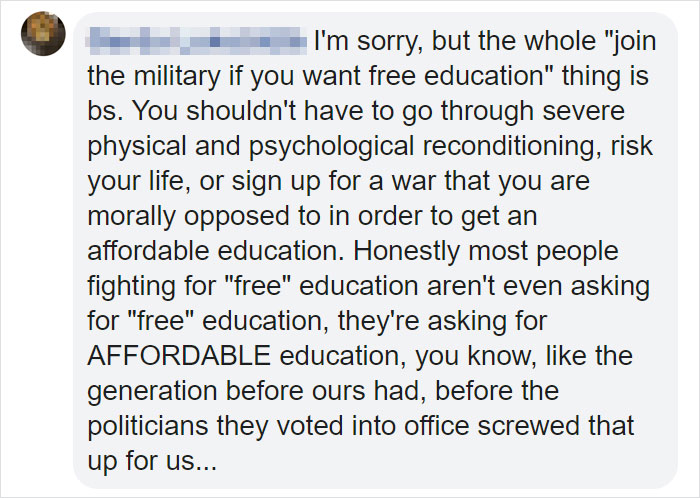
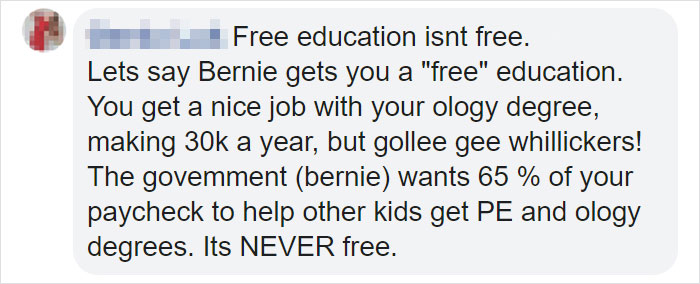
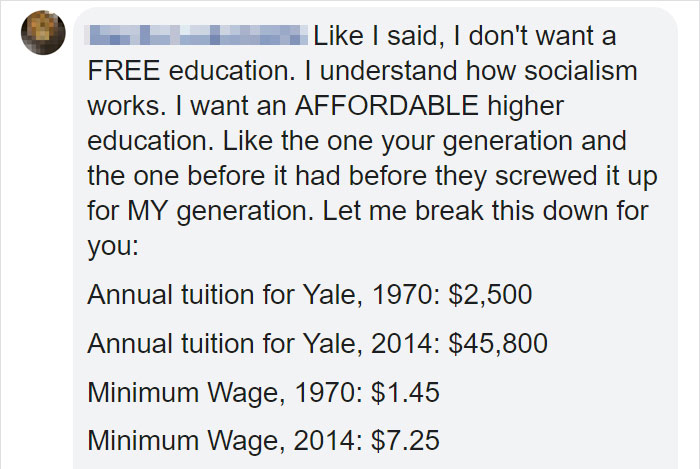
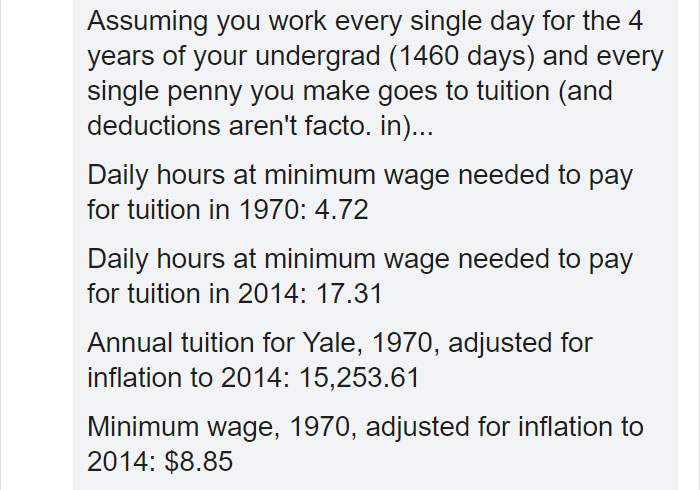
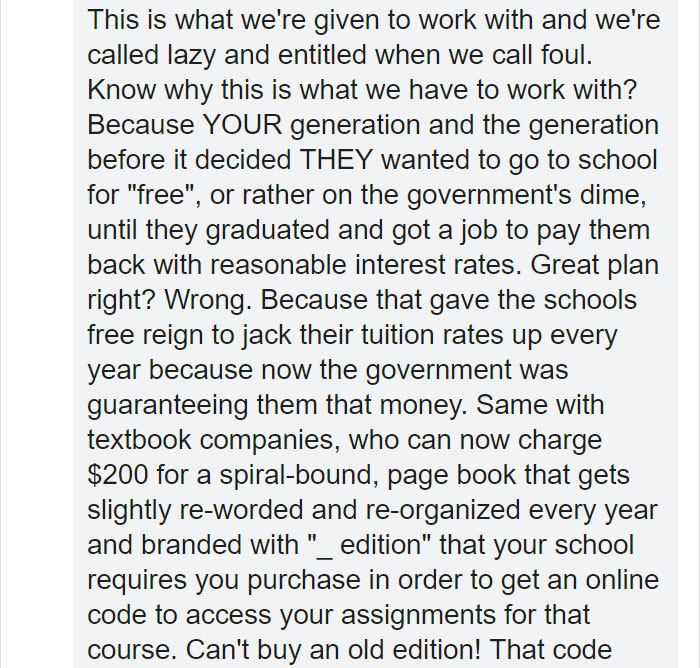
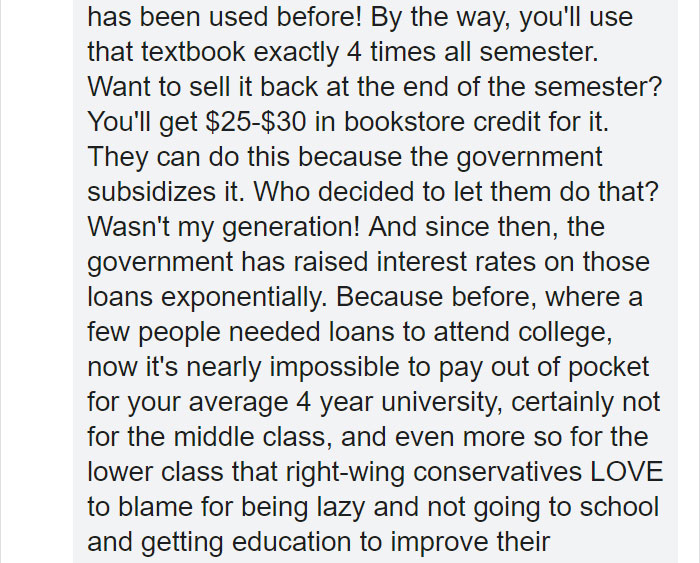
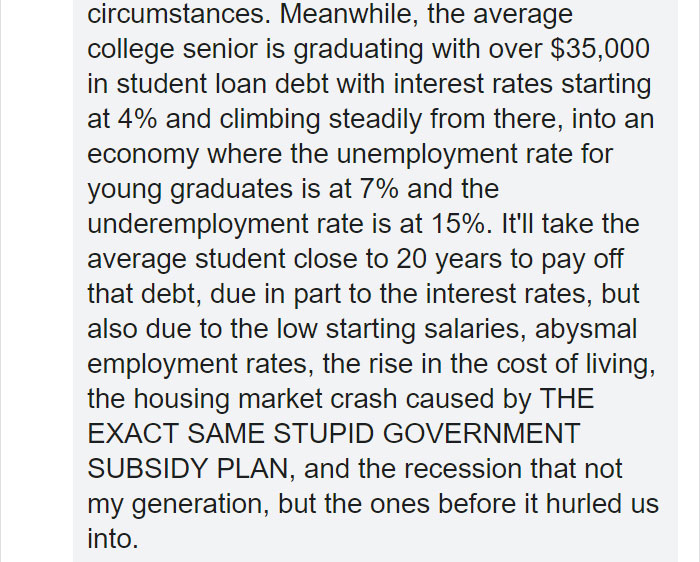
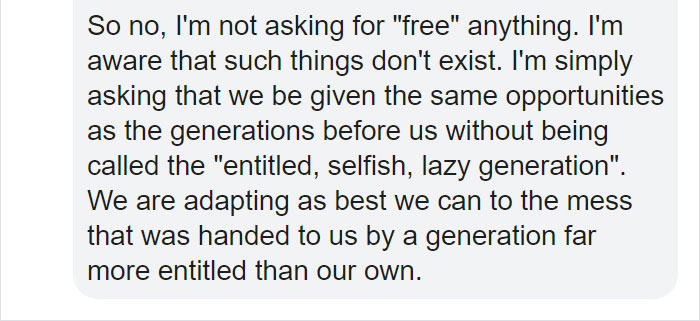
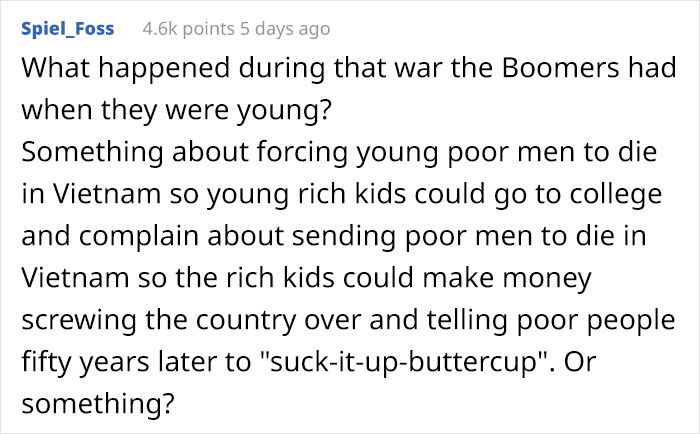
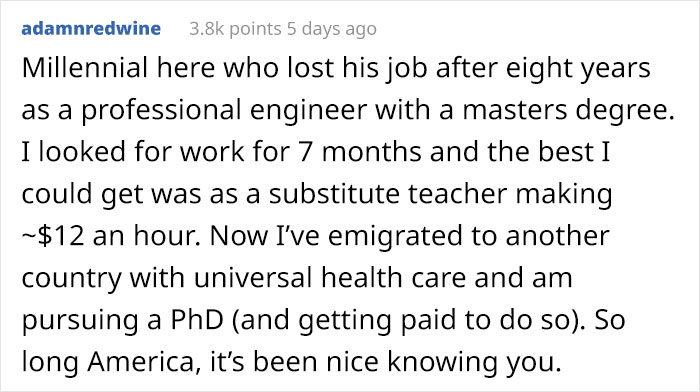
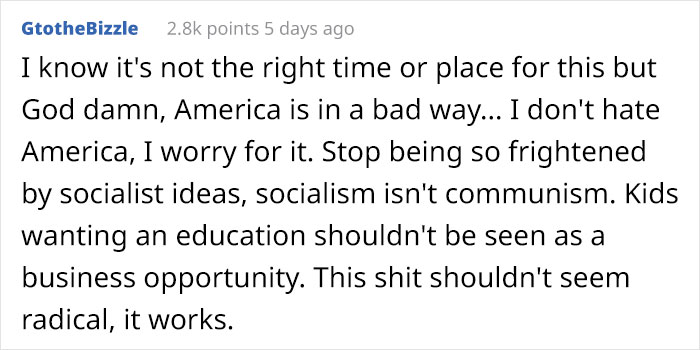

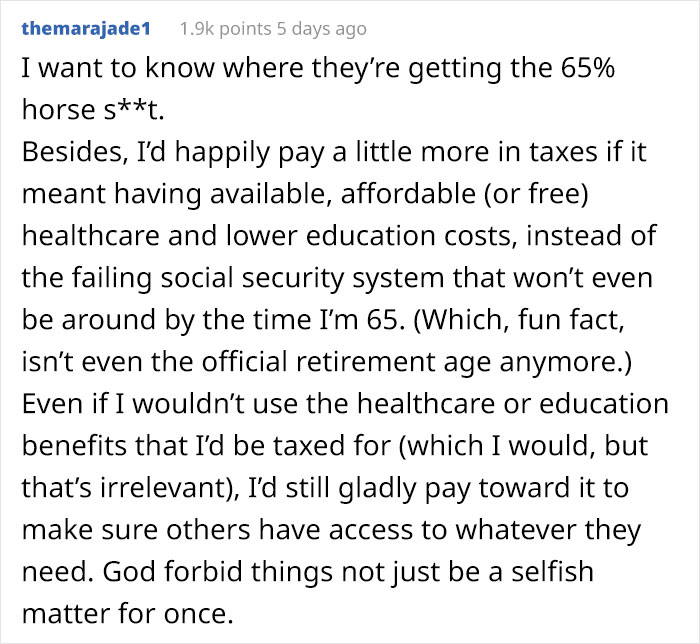
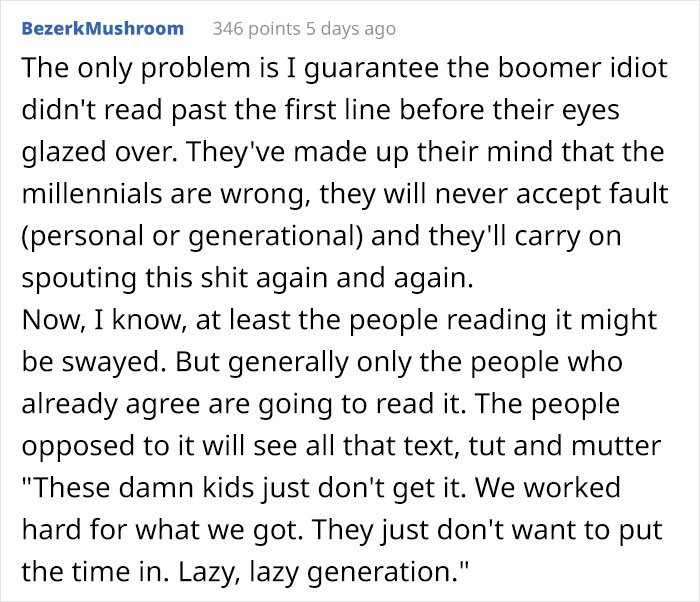

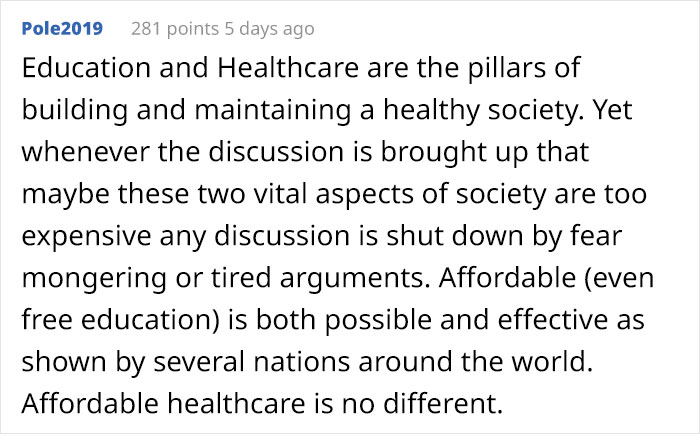
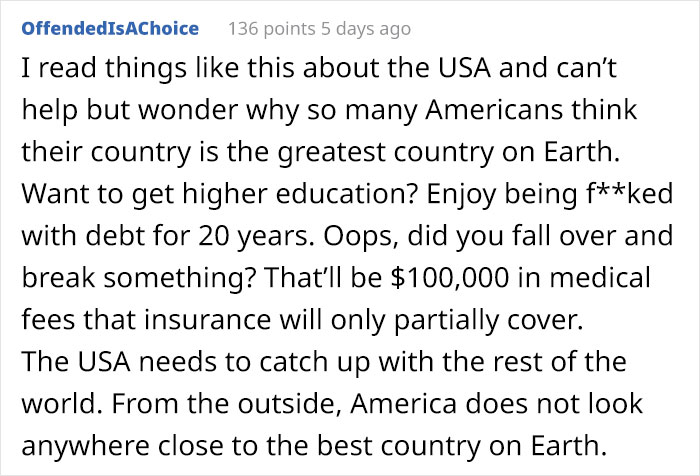

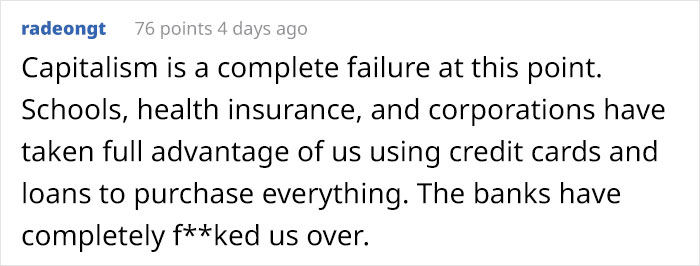
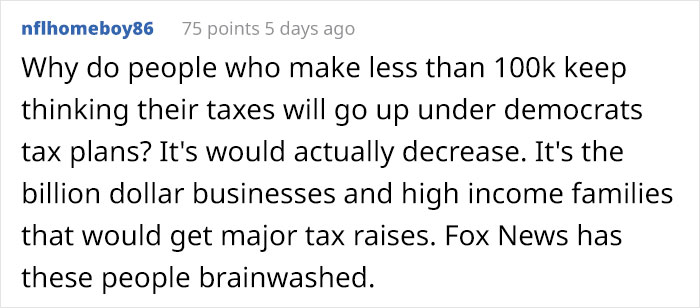

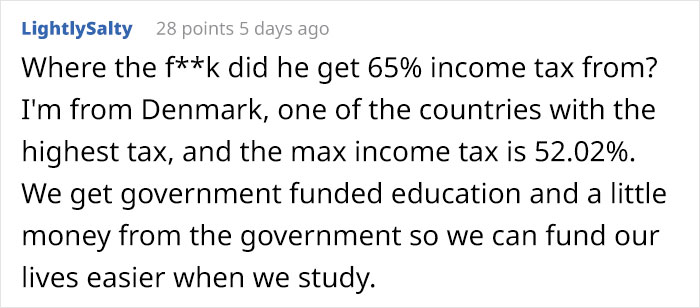








183
201